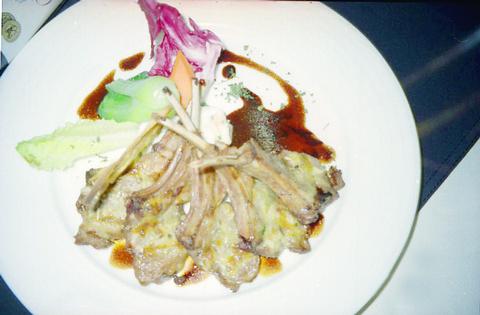Chez Moi is settled among a cornrow of restaurants along Kuangfu S. Rd. near Sun Yat-sen Memorial Hall. Fine dining can be found in each of the lanes sprouting off the main strip; cuisines from Shanghai, northern China, Japan, Italy and others. Were it not for the tiny but elegant terrace, this small French restaurant would easily be overlooked.
In keeping with its name, the restaurant has a homey feel from the minute you walk in the door. The scene is polished, not complicated. "We want everyone to come to our house feeling easy and relaxed, just like coming home, said owner Daniel Wen (

PHOTO: YU SEN-LUN
The restaurant's most inviting area is the lounge, where a fireplace, stereo and sofas call out to patrons. No doubt it's everyone's favorite place in the restaurant. People usually have one or two glasses of champagne on the couch before heading to their table in the dining area. After dinner, this is also where people return to enjoy a coffee, smoke a cigar, listen to classical music or just chat. No wonder Wen said several of the house's customers have become regulars. Many hail from Taiwan's diplomatic and financial circles. The lounge is a perfect space to rub elbows and make friends.
There are about 10 entrees from which to choose, not many for a restaurant the size of Chez Moi. But, as Wen said, they present each of their dishes with a full guarantee. He said each of restaurant's chefs must go for a blue belt in France once a year for on-the-job-training.
Grilled lamb chops with herb butter is a first recommendation. The pink-colored lamb is topped with rich herb butter, with dark gravy and vegetables on the side. The dish is simple but satisfying.
Duck lovers should try the confit of duck leg. The legs, with oil and juice sealed inside during grilling, is extra juicy and fragrant. This is a dish not easily found in many restaurants in Taipei. Lastly, the house's German pig knuckle with sauerkraut is definitely worth a try.
"We don't like to promote set menus for customers," said Wen. "The most important thing is to relax and enjoy the good flavors." So, at Chez Moi, the portions can be negotiated, said Wen.
As the season for Beaujolais Nouveau has just arrived, the house will be presenting special dishes to accompany the wines.

April 28 to May 4 During the Japanese colonial era, a city’s “first” high school typically served Japanese students, while Taiwanese attended the “second” high school. Only in Taichung was this reversed. That’s because when Taichung First High School opened its doors on May 1, 1915 to serve Taiwanese students who were previously barred from secondary education, it was the only high school in town. Former principal Hideo Azukisawa threatened to quit when the government in 1922 attempted to transfer the “first” designation to a new local high school for Japanese students, leading to this unusual situation. Prior to the Taichung First

Chinese Nationalist Party (KMT) Chairman Eric Chu (朱立倫) hatched a bold plan to charge forward and seize the initiative when he held a protest in front of the Taipei City Prosecutors’ Office. Though risky, because illegal, its success would help tackle at least six problems facing both himself and the KMT. What he did not see coming was Taipei Mayor Chiang Wan-an (將萬安) tripping him up out of the gate. In spite of Chu being the most consequential and successful KMT chairman since the early 2010s — arguably saving the party from financial ruin and restoring its electoral viability —

The Ministry of Education last month proposed a nationwide ban on mobile devices in schools, aiming to curb concerns over student phone addiction. Under the revised regulation, which will take effect in August, teachers and schools will be required to collect mobile devices — including phones, laptops and wearables devices — for safekeeping during school hours, unless they are being used for educational purposes. For Chang Fong-ching (張鳳琴), the ban will have a positive impact. “It’s a good move,” says the professor in the department of

Article 2 of the Additional Articles of the Constitution of the Republic of China (中華民國憲法增修條文) stipulates that upon a vote of no confidence in the premier, the president can dissolve the legislature within 10 days. If the legislature is dissolved, a new legislative election must be held within 60 days, and the legislators’ terms will then be reckoned from that election. Two weeks ago Taipei Mayor Chiang Wan-an (蔣萬安) of the Chinese Nationalist Party (KMT) proposed that the legislature hold a vote of no confidence in the premier and dare the president to dissolve the legislature. The legislature is currently controlled